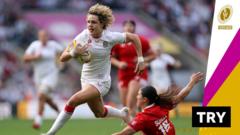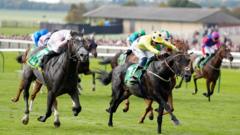Is the Phrase Come On Lads Now Offensive in Football?

Published: 2025-09-27 13:48:59 | Category: Football
Recent guidance from the Berks and Bucks Football Association (FA) has stirred controversy by advising footballers to avoid traditional phrases like "come on lads," as part of an effort to promote inclusivity in the sport. This initiative aims to create a more welcoming environment for all participants, reflecting a shift towards modern language in the game. However, the recommendations have faced criticism, with some viewing them as unnecessary or even sinister.
Last updated: 19 October 2023 (BST)
Understanding the Inclusive Language Guide
The Berks and Bucks FA, which represents over 600 clubs and 34,000 players, has launched an inclusive language guide aimed at fostering a more welcoming atmosphere in grassroots football. The guide includes several key recommendations that reflect changing societal norms and preferences in language.
Key Takeaways
- The phrase "come on lads" is now deemed offensive and discouraged.
- "Assistant referee" is recommended over "linesman" for gender neutrality.
- The guide aims to promote inclusivity and respect within the sport.
- Critics express concerns about the implications of enforcing such language changes.
- Supporters argue it is a necessary step towards modernising football culture.
The Motivation Behind the Changes
Callum Salhotra, the community and inclusion manager at Berks and Bucks FA, explains that the guide aims to support the development of an inclusive environment. "This will help us all take simple but meaningful steps to ensure our game is inclusive, respectful, and welcoming to everyone," Salhotra stated. The intention behind these recommendations is to promote equality and representation in a sport that has historically been male-dominated.
What’s New in the Guide?
The guide includes various suggestions for more inclusive language. For example, the term "assistant referee" is recommended instead of "linesman," which some consider outdated due to its gender-specific connotations. The move away from "come on lads" is aimed at removing language that may inadvertently exclude or offend individuals who do not identify with male pronouns.
Reactions to the Guide
While the Berks and Bucks FA's intentions may be noble, the response has been mixed. Critics, including Sir John Hayes, chairman of the Common Sense group of Conservative MPs, have labelled the guide as "daft" and "sinister." Hayes expressed concern that such language prescriptions mirror tactics historically used by authoritarian regimes to control speech. His comments underscore a broader debate surrounding political correctness and the evolution of language in society.
The Impact of Language in Sports
Language plays a crucial role in shaping the culture of any sport. In football, phrases like "come on lads" have been entrenched in the vernacular for generations. As sports evolve and society becomes more aware of inclusivity issues, language must adapt to reflect these changes. However, this adaptation can lead to resistance, especially from those who view such changes as unnecessary or overly prescriptive.
Why This Matters
The push for inclusive language in football is not just about words; it represents a broader cultural shift within the sport. As grassroots football continues to grow, ensuring that everyone feels welcome and respected is paramount. This initiative highlights the importance of creating a space where all individuals, regardless of gender, background, or identity, can participate fully and comfortably.
Potential Consequences of Resistance
Opposition to these changes could have significant implications for grassroots football. If organisations resist adapting their language and practices, they risk alienating diverse players and communities. This alienation could stifle participation and limit the sport's growth, countering the very goals the Berks and Bucks FA aims to achieve.
What Happens Next?
The future of inclusive language in football remains uncertain. As these discussions continue, it will be crucial for the Berks and Bucks FA and other governing bodies to engage with critics and supporters alike. Finding common ground will be vital to ensure that all voices are heard and that the sport evolves in a manner that respects tradition while embracing inclusivity.
Looking Ahead
As football clubs and associations across the UK consider their own policies, the Berks and Bucks FA's guide may serve as a template for future initiatives. The challenge will be balancing tradition with the need for modernisation in language and practice. The ongoing dialogue surrounding language use in football reflects larger societal conversations about inclusion, respect, and community.
FAQs
What is the purpose of the inclusive language guide?
The inclusive language guide aims to promote a welcoming and respectful environment in grassroots football by encouraging the use of language that includes all individuals, regardless of gender or background.
Why is "come on lads" considered offensive?
The phrase "come on lads" is viewed as gender-specific and potentially exclusionary, particularly to non-male players. The guide suggests more neutral alternatives to foster inclusivity.
What are some other recommendations from the guide?
Other recommendations include replacing "linesman" with "assistant referee" to reflect gender neutrality and using language that does not assume gender or identity.
Who supports the guide?
Supporters of the guide, including the Berks and Bucks FA, believe it is a necessary step toward creating an inclusive football culture that respects and welcomes everyone.
What are the criticisms of the guide?
Critics, like Sir John Hayes, argue that the guide is overly prescriptive and could lead to the distortion of language, viewing it as an unnecessary infringement on common expressions in the sport.
What is the future of inclusive language in football?
The future of inclusive language in football will depend on ongoing discussions between supporters and critics, as well as the willingness of football organisations to adapt and embrace change while respecting tradition.
As the conversation surrounding language in football continues, how will this shape the future of the sport? Can a balance be found between inclusivity and tradition? #FootballInclusivity #GrassrootsFootball #LanguageMatters



